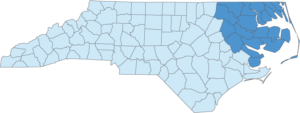
Environmental Health Specialist

Climate Impact Specialist
- Make a difference: Environmental health specialists work to protect people from environmental hazards, such as air pollution, contaminated water, and lead poisoning. They can make a real difference in the lives of others by helping to improve air quality, reduce water pollution, and prevent exposure to harmful chemicals and bacteria.
- Variety of career options: There are many different career options available to environmental health specialists. They can work for government agencies, private businesses, non-profit organizations, and consulting firms. Environemtal health specialists that are primarily focusing on public health in eastern NC, work in the local health departments.
- Opportunities for growth and advancement: With the right skills and experience, environmental health specialists can move into leadership positions or specialize in a particular area of environmental health, such as food protection programs, septic and private water supply well programs, childcare and school sanitation programs, and asbestos and lead based paint programs.
- High demand: The demand for environmental health specialists is growing, as people become more aware of the importance of environmental health and how it effects our community’s overall wellbeing. This career field is evolving as our climate and environment are constantly changing.
- Education Pathway: This career field requires a high school diploma and graduation from a four-year university or college with a major in environmental health from a program which is accredited by the National Accreditation Council for Environmental Health Curricula of the National Environmental Health Association. Other alternatives to this education pathway would be a four-year degree from a college or university with at least 30 semester hours of course work in physical or biological sciences. Those that advance in the career field often times complete master’s degree programs in environmental health science or related fields.
Here are some specific tasks that environmental health specialists do:
- Conduct inspections of childcare and school facilities
- Conduct restaurant inspections to ensure sanitization requirements
- Conduct private septic and water supply wells inspections
- Review and design septic and water supply well systems to ensure optimal function and environmental protection
- Review new construction and substantial renovations of existing facilities
- Monitor air and water quality to identify and track pollutants and harmful bacteria.
- Investigate environmental health hazards, such as lead poisoning cases.
- Develop and implement programs to improve environmental health, such as recycling programs.
- Educate the public about environmental health risks and prevention measures.
If you are interested in a career that combines science, public health, and problem-solving, then environmental health specialist may be a good fit for you. It is a rewarding career that allows you to make a difference in your community.
Here are some of the skills that are essential for environmental health specialists:
- Strong analytical and problem-solving skills
- Excellent communication and interpersonal skills
- Ability to work independently and as part of a team
- Ability to use scientific equipment
- Ability to independently plan and schedule work activities
- Ability to apply environmental health knowledge and techniques in the investigation of environmental health problems
- Ability to analyze and comprehend a wide variety of technical and administrative regulations, records, and reports



